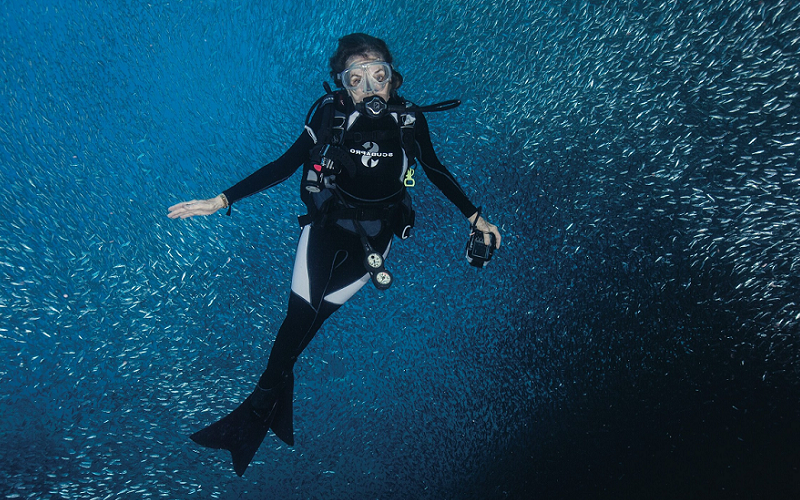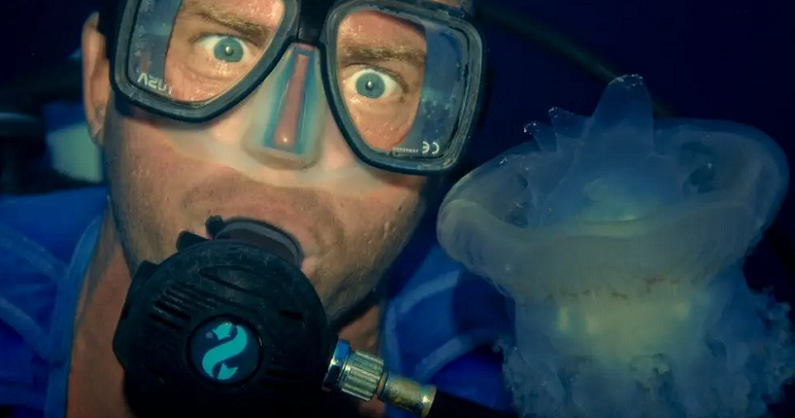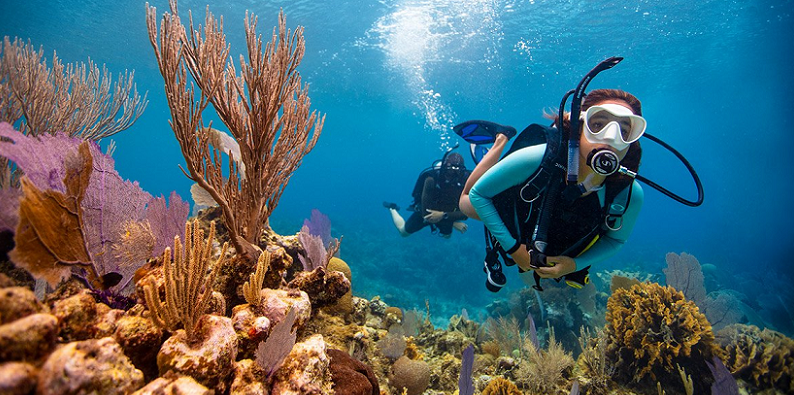
The vast, silent expanse of the deep sea has long held a magnetic allure for adventurers and scientists alike. But as we explore these uncharted depths, we’re discovering that our underwater journeys may be influencing more than just our physical being — they might also be shaping the very patterns of our thoughts. Brainwaves, the rhythmic electrical pulses that underpin every cognitive function, play an indispensable role in our overall mental health and well-being. Could the profound depths of the ocean be impacting the depths of our consciousness?
Contents
Deep Sea Environment and Its Effects on the Brain
The mysterious environment of the deep sea is unlike any other on Earth. It presents a unique set of challenges to divers, with its high pressures, cold temperatures, and intense darkness. Yet, the sheer wonder of exploring this alien world can also offer unparalleled psychological experiences.
Physical Conditions
The physical challenges of deep-sea diving are evident to anyone who descends into the abyss. But beyond the obvious, the subtle intricacies of this environment can bring about significant shifts in our cognitive processes.
Pressure and Its Impact
As divers descend, the pressure increases exponentially. This is due to the weight of the water column above them. The human body, and notably the brain, is primarily composed of water, which is incompressible. However, the body’s air-filled cavities, like the middle ear and sinuses, can be affected.
This increased pressure can influence the solubility of gases, leading to conditions like nitrogen narcosis, sometimes referred to as “rapture of the deep.” This condition can manifest as a feeling of euphoria, but it can also impair judgment, attention, and motor skills. These cognitive effects, while temporary and reversible upon ascending to shallower depths, are a direct result of the deep-sea environment.
Temperature Variations
Water temperatures in the deep sea can be significantly colder than at the surface. While diving suits provide insulation, prolonged exposure to cold water can affect the body’s core temperature. Hypothermia, if it sets in, can influence cognitive abilities. Cold temperatures can slow brain activity, impairing reaction times, decision-making capabilities, and even memory [1].
Psychological Aspects
Beyond the physical, the deep-sea environment can evoke a range of emotions and psychological responses in divers. The sensations felt here are unlike any other, and they can leave a profound impact on a diver’s psyche.
Sensation of Isolation and its Cognitive Impacts
The deep sea can be a place of profound solitude. With vast expanses of water separating divers from the surface and the world they know, a sense of isolation can emerge. This isolation, for some, can be meditative, providing a space free from distractions, where one’s thoughts can roam unbridled. For others, it can be unsettling, leading to feelings of vulnerability or anxiety. The cognitive response to this isolation can vary widely but is undeniably shaped by the unique environment of the deep sea.
The Role of Darkness and Limited Visibility
As one descends deeper into the ocean, sunlight diminishes, and complete darkness can envelop divers. This absence of light, combined with the potential for limited visibility due to sediment or marine life, can play tricks on the mind. Spatial awareness can become compromised, and the brain may need to rely more heavily on other senses like touch or hearing. Additionally, the darkness can amplify feelings of vulnerability or even lead to hallucinations in some divers [2].

Unveiling the Brainwave Changes During a Dive
Diving into the deep sea is not just a physical journey; it’s a neural voyage, with our brainwaves oscillating in response to this unique environment. By understanding these shifts, we can gain valuable insights into our cognitive processes during a dive and even tap into potential therapeutic benefits.
Before the Dive: Baseline Measurements
To truly appreciate the influence of deep-sea diving on our brainwaves, it’s crucial to establish a point of reference. This baseline provides the foundation from which we can measure and compare subsequent shifts.
Establishing a Control Point
Before embarking on a dive, it’s advisable for divers to measure their resting brainwave activity using EEG (electroencephalogram) equipment. This provides a snapshot of the brain’s electrical patterns in a relaxed, neutral state. This baseline measurement will later offer a comparison point to determine any significant shifts due to the diving experience.
Variables to Consider
Several variables can influence baseline brainwave activity. Factors such as the diver’s emotional state, fatigue level, and any pre-existing medical conditions need to be accounted for. These elements can serve as confounding variables when assessing the cognitive impacts of deep-sea diving [3].
During the Dive
As divers begin their descent, a myriad of factors, from the mesmerizing beauty of marine life to the challenges posed by the physical environment, can elicit changes in brainwave activity. These shifts can offer profound insights into the brain’s adaptability and response mechanisms.
Patterns of Shifts in Different Brainwave Frequencies
Each brainwave frequency—Delta, Theta, Alpha, Beta, and Gamma—has its own unique attributes and correlates to specific states of consciousness. Here’s how deep-sea diving might influence each:
Delta Waves
Associated with deep, dreamless sleep and the unconscious mind, Delta waves are the slowest of the brainwaves. While one might not expect a surge in Delta activity during a dive, moments of profound relaxation or trance-like states might evoke a slight increase in these waves.
Theta Waves
Linked to deep relaxation, meditation, and the threshold of sleep, Theta waves often see a spike during dives. The serene underwater environment, combined with the rhythmic pattern of breathing, can enhance Theta activity, promoting a meditative state.
Alpha Waves
Representing a relaxed alertness, Alpha waves might increase during moments when divers are calmly observing their surroundings, immersed in the beauty of the underwater world but remaining attentive to their environment.
Beta Waves
Associated with active, analytical thought, Beta wave activity might elevate during challenging situations, like navigating strong currents or troubleshooting equipment. These waves reflect the brain’s heightened state of alertness and problem-solving.
Gamma Waves
The fastest of the brainwaves, Gamma waves, are linked to higher cognitive functions and information processing. While there’s limited research on Gamma wave shifts during diving, it’s plausible that moments of awe or profound insights might stimulate an increase in this frequency.
The Role of Dive Duration and Depth
The length and depth of a dive can further influence brainwave patterns. Longer dives might prolong exposure to the calming effects of the deep sea, enhancing Theta and Alpha wave activity. Conversely, deeper dives, with increased pressure and potential for nitrogen narcosis, might lead to altered brainwave patterns, reflecting the brain’s adaptability to these conditions [4].

Cognitive and Emotional Outcomes of Diving-Induced Brainwave Changes
The shifts in brainwave activity during a dive aren’t merely abstract neural patterns; they manifest in tangible cognitive and emotional outcomes that divers experience. By examining these outcomes, we can glean a deeper understanding of the profound impact deep-sea diving can have on our mental and emotional well-being.
Enhanced Creativity and Problem-Solving Abilities
The environment of the deep sea can be as challenging as it is mesmerizing. As divers navigate this world, their brains often switch gears, tapping into reservoirs of creativity and problem-solving abilities.
The Theta-Alpha Connection
The spike in Theta and Alpha brainwave activity, as mentioned earlier, can foster an ideal environment for creative insights. Theta waves, in particular, are linked to our subconscious, where novel ideas often germinate. The interplay between Theta and Alpha waves can lead to moments of “eureka” where solutions to problems emerge seemingly out of the blue.
Adapting to the Unknown
The unpredictable nature of the ocean means divers often encounter unforeseen challenges. Whether it’s adapting to changing currents or devising ways to interact with marine life safely, these situations require quick thinking and adaptability. The increased Beta wave activity supports analytical thought processes, helping divers find innovative solutions on the spot.
Potential for Meditation and Mindfulness
Deep-sea diving can be a profoundly meditative experience, providing an opportunity for introspection and mindfulness that few other environments offer.
The Dance of Theta Waves
The elevated Theta activity, reminiscent of deep meditation states, allows divers to experience moments of profound relaxation and connection. This state can lead to a heightened awareness of one’s surroundings and self, promoting mindfulness.
Breathing: The Anchor to the Present
The rhythmic pattern of breathing, crucial for divers, can become a focal point, much like in meditation practices. This focus on breath can anchor divers to the present moment, fostering a deep sense of presence and mindfulness amidst the vast expanse of the ocean.
Emotional Responses: Calmness vs. Anxiety
While many divers recount feelings of tranquility and awe during their underwater journeys, the deep-sea environment can also evoke feelings of vulnerability or anxiety for some [5].
The Dual Nature of the Deep Sea
The deep sea can be both serene and intimidating. On one hand, the beauty of marine life and the sensation of weightlessness can elicit feelings of calmness and wonder, buoyed by increased Alpha wave activity. On the other, the vastness and isolation can be overwhelming, potentially leading to anxiety, especially for novice divers.
It’s essential for divers to recognize and navigate their emotional responses. Training and familiarity with the environment can help mitigate feelings of anxiety. Moreover, the understanding that certain brainwave patterns, like heightened Beta activity, might be contributing to these feelings can provide divers with tools to recalibrate their emotional state.
References
[1] Memory and attention while SCUBA diving at shallow and deep depths
[2] When the human brain goes diving
[3] Neurological long term consequences of deep diving
[4] Effects of Diving on the Brain
[5] My Brain Goes into Overdrive When I Scuba Dive
